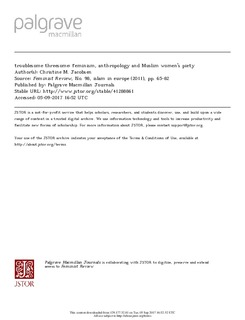Troublesome threesome: Feminism, anthropology and Muslim women's piety
Journal article, Peer reviewed
Permanent lenke
http://hdl.handle.net/11250/2484807Utgivelsesdato
2011-01-01Metadata
Vis full innførselSamlinger
- Publications [1488]
Originalversjon
in Feminist Review no. 98 pp. 65-82Sammendrag
This article critically addresses recent anthropological and feminist efforts to theorize and analyse Muslim women's participation in and support for the Islamic revival in various manifestations. Drawing on ethnographic material from research on young Muslims engaged in Islamic youth and student-organizations in Norway, I investigate some of the challenges that researching religious subjectivities and practices pose feminist theory. In particular, I deal with how to understand women's religious piety relation to questions of self, agency and resistance. Engaging with Saba Mahmood's work on The Politics of Piety, this article suggests ways of understanding the young women's religious engagement that move beyond the confines of a binary model subordination and resistance, coercion and choice. Grounding the discussion in ethnographic analysis of how young Muslim women in Norway speak about the 'self', I argue that critically revisiting feminist notions of agency, autonomy and desire, is necessary in order to understand the kinds of self-realization that these women aspire to. However, the article argues against positing Muslim conceptions and techniques of the self as 'the other' of liberal-secular traditions. Rather, I show how configurations of personhood, ethics and self-realization drawn from Islamic and liberal-secular discursive formations inhabit not only the same cultural and historical space, but also shape individual subjectivities and modes of agency.
Serie
Feminist Review no. 98Feminist Review no. 98
